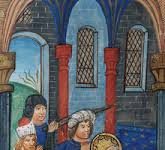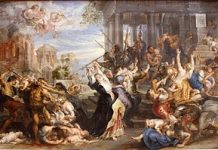On this day in 325, the first version of the Nicene Creed was adopted by the Council of that name, the first such ‘ecumenical’ gathering in the Church, with the Second Vatican Council being the 21st such. We will see if God wills any further Councils, and more on that, perhaps, anon. The key to the Creed was the insertion of the term ‘homo-ousios’ – ‘same substance’ – in Greek, to describe the Son’s relation to the Father, that Christ truly was the same divine nature, ‘God from God, Light from Light, true God from true God, begotten, not made, consubstantial (homoousios) with the Father‘. The Trinity and the Incarnation are the two essential foundations of our Christian and Catholic Faith, signifying that God is a subsistent relation of knowledge and love, who bestows such upon His creatures, especially Man, made in His very image.
In one of those ironies of history, this day in 1785 also marks the foundation of the first Unitarian church in the United States, based on James Freeman’s revised prayer book. The Unitarians, as their name implies, deny the Trinity and, hence, the Incarnation – much like, by the bye, Islam. Charles Darwin’s wife, Emma Wedgewood, was a Unitarian. As her husband drifted into agnosticism, she feared for his salvation, that they might be separated for eternity. At least she believed in a judgement, and a God, and that this life meant something beyond this brief transitory existence, which is what modern ‘Darwinism’ implies, whatever Darwin himself believed in his heart of hearts.
We are made for far, far greater things that the here and now, as Christ promised, brimming over, to the full. Life is liminal, or ’tis not life at all, and we can but glimpse what is in store for those who love God, and live in that relationship with the Trinitarian God, revealed in the Son, Who wills our salvation far more than we ever could.










